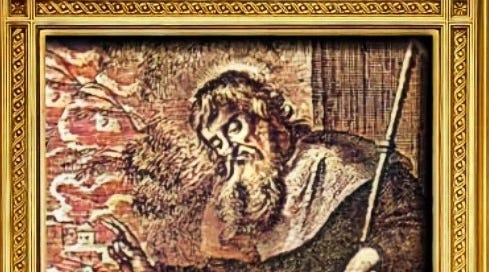May 21 Saint Godric of Finchale (Godrick) Hermit.
May 21 Saint Godric of Finchale (Godrick) Hermit.
1069 - 1170
Patronage:
Finchale, England
Walpole, England
.
Oldest of three children born to a freedman Anglo-Saxon farmer. An adventurous seafaring man, Godric spent his youth in travel, both on land and sea, as a peddler and merchant mariner first along the coast of the British Isles, then throughout Europe. Sometime sailor, sometime ship’s captain, he lived a seafarer’s life of the day, and it was hardly a religious one. He was known to drink, fight, chase women, con customers, and in a contemporary manuscript, was referred to as a “pirate”. One historian indicates that he may be the Gudericus pirata who carried Baldwain to Jaffa in 1102.
.
Converted upon visiting Lindisfarne during a voyage, and being touched by the life of Saint Cuthbert of Lindisfarne. He immediately went on a pilgrimage to Jerusalem, where he visited the Holy Sepulchre. Coming out of the Jordan River, and looking down at his feet, he vowed, “Lord, for love of Your name, Who for men’s salvation walked barefoot through the world, and did not deny to have Your naked feet struck through with nails for me: From this day I shall put no shoes upon these feet.” He kept this vow until his death, even in the snow.
.
Returning to England via Santiago de Compostella, he became a house steward until he realized that the landowner was acting unjustly toward his poorer neighbors. Upon resigning he went on a pilgrimage to the shrine of Saint Giles in Provence and to Rome with his mother.
.
In Cumberland he acquired a Psalter, which became his most valued possession, and learned it by heart. In 1105, he sold all his goods and travelled to Wolsingham, where he joined up with an elderly hermit named Aelric, with whom he spent two years. After Aelric’s death, Godric made another pilgrimage to Jerusalem, where he lived for a time with the hermits of Saint John the Baptist and worked in a hospital for several months.
.
In a vision, Saint Cuthbert promised Godric a hermitage in England, so he returned and spent some time in Eskedale and Durham, where he acted as a sacristan and went to school with the choirboys at Saint Mary-le-Bow. Then he found his hermitage in Bishop Flambard’s hunting grounds on the River Wear near Durham.
.
He spent the next 60 years in the Finchale forest living an austere life of mortification. At first he lived on berries and roots, but later he grew vegetables and milled and baked his own barley. He wore a hair shirt under a metal breastplate. Godric built a wattle oratory and later a small stone church dedicated to Saint Mary. Twice he nearly died, once when he was caught in a flood, and once when Scottish soldiers beat him on the assumption that he had hidden valuables.
.
He lived mainly alone under the guidance of the prior of Durham, who supplied him with a priest to say Mass in his chapel and would send strangers to him to ask his advice. These visitors included Saints Aelred and Robert of Newminster, and the monk named Reginald who wrote the included biography. Saint Thomas à Becket and Pope Alexander III also sought his advice. Godric’s sister Burchwen lived with him for a time but then became a sister in the hospital at Durham.
.
Godric had the gift of prophecy. He foretold the death of Bishop William of Durham and Saint Thomas a Becket – whom he had never met. He often saw visions of scenes occurring at a distance and was known to stop mid-sentence to pray for ships in danger of shipwreck. Noted for his close familiarity with wild animals, his supernatural visions, his gift of prophecy, and ability to know of events occurring hundreds or thousands of miles away. Counseled Saint Aelred, Saint Robert of Newminster, Saint Thomas Beckett, and Pope Alexander III. Wrote poetry in Medieval English.
.
He suffered a long illness during which the monks of Durham nursed him, but he died after foretelling his own death. His biographer, Reginald, recorded four songs that Godric said had been taught to him in visions of the Blessed Virgin, his dead sister, and others. They are the oldest pieces of English verse of which the musical settings survive, and are the oldest to show the use of devices of rhyme and measure instead of alliteration.
.
Godric was remarkable for his austerities, supernatural gifts, and his familiarity with wild animals.
.
Eternal Father, I wish to honor St. Godric, and I give Thee thanks for all the graces Thou hast bestowed upon him. I ask Thee to please increase grace in my soul through the merits of this saint, and I commit the end of my life to him by this special prayer, so that by virtue of Thy goodness and promise, St. Godric might be my advocate and provide whatever is needed at that hour. Amen.



